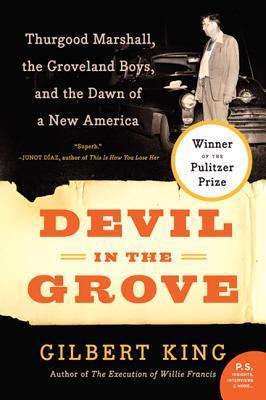More on this book
Community
Kindle Notes & Highlights
by
Gilbert King
Read between
February 4, 2018 - February 24, 2019
It wasn’t the indentation of the rope that had cut into the flesh below the dead man’s chin, or even the bullet holes riddling his body, that caused Marshall, drenched now in sweat, to stir in his sleep. It was the virtually angelic faces of the white children, all of them dressed in their Sunday clothes, as they posed, grinning and smiling, in a semicircle around Rubin Stacy’s dangling corpse. In that horrid indifference to human suffering lay the legacy of yet another generation of white children, who, in turn, would without conscience prolong the agony of an entire other race.
“You know,” Marshall said to him, “sometimes I get awfully tired of trying to save the white man’s soul.”
“Lose your head, lose your case,” was the phrase Marshall’s mentor, Charles Hamilton Houston, had drilled into him in law school. Marshall could tell that his adversary, seated alone at the prosecutor’s table, was in the foulest of moods as he was forced to contemplate the political ramifications of the unthinkable: his failure to win a single conviction against black lawyers defending black men accused of the attempted murder of white police in Maury County, Tennessee.
Marshall had paid close attention to the desperation in Bumpus’s closing statement to the jury, when the prosecutor warned them that if they did not convict, “law enforcement would break down and wives of jurymen would die at the hands of Negro assassins.” None of it surprised Marshall. He was used to, and even welcomed, such tactics from his opponents because they often helped to establish solid grounds for appeals.
Barbara liked this
W. J. Cash, in his seminal exploration of Southern culture, The Mind of the South, wrote that while “the actual danger of the Southern white woman’s being violated by the Negro has always been comparatively small . . . much less, for instance, than the chance that she would be struck by lightning,” it was “the most natural thing in the world for the South to see it as very great, to believe in it, fully and in all honesty, as a menace requiring the most desperate measures if it was to be held off.” In Cash’s estimation, the Southern rape complex “had nothing immediately to do with sex,” but
...more
Barbara liked this
Terence McCarthy, a British economist and writer studying peonage in the South, arrived in Groveland in the aftermath of the rioting. On a tour of Stuckey Still and Bay Lake, his driver, a Klansman, pointed out the ashy remains of Henry Shepherd’s home.
McCarthy learned that whites in Groveland (who accounted for about 60 percent of the town’s population of one thousand) were tolerant of blacks, as long as they continued to work in white-owned citrus groves. “The Negroes do most of the work around here,” the Klansman told McCarthy. “It’s these nigger farmers—they’ve got to go.”
Black farmers like Henry Shepherd and his family threatened, “by their example, the whole system of servitude and forced labor which is the base of the local economy,” McCarthy wrote. He noted that the whites he spoke with were less interested in seeking revenge for the rape of Norma Padgett than in seeing the demise of “all independent colored farmers.”
Barbara liked this


